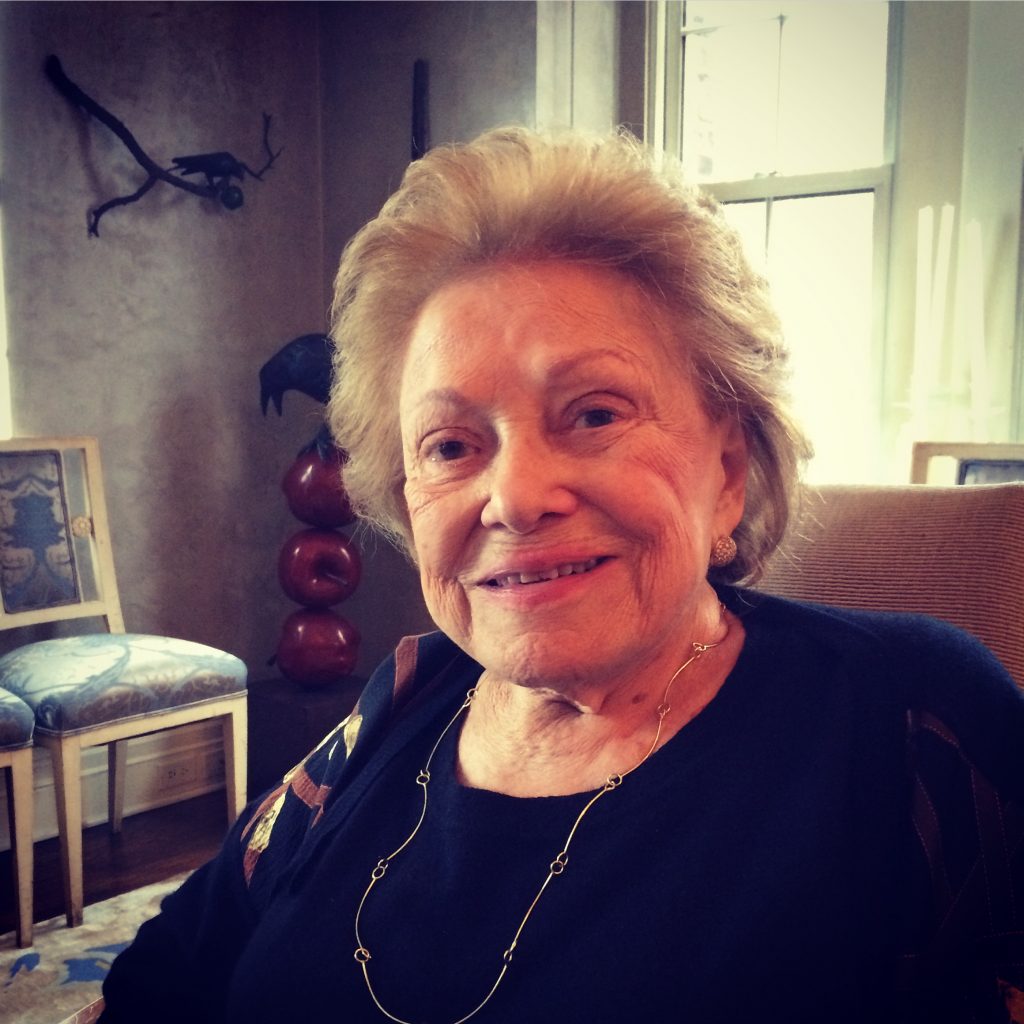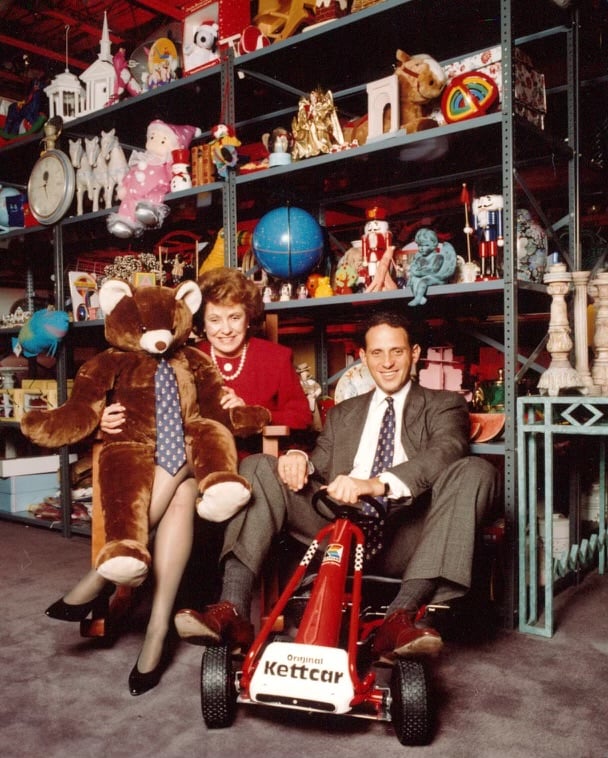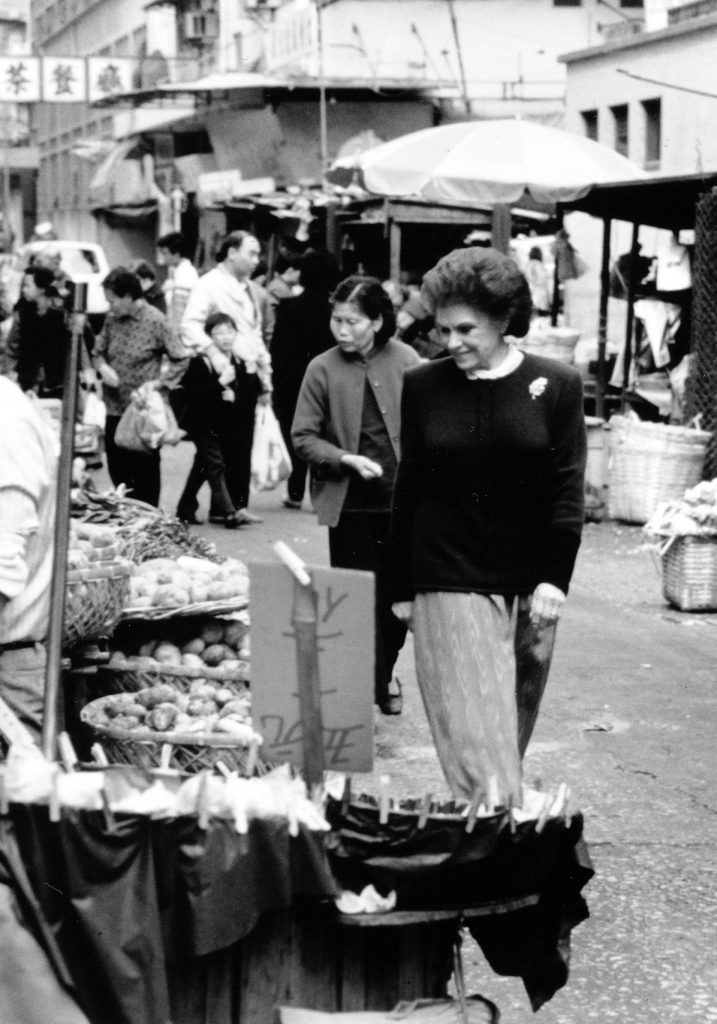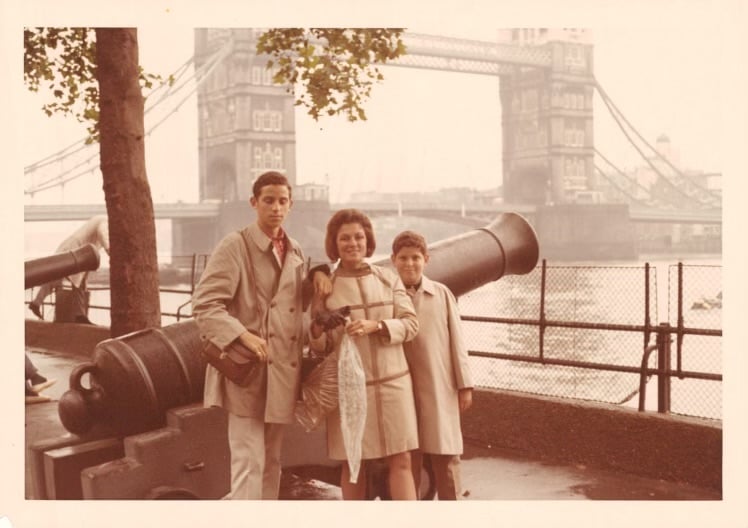If you Google Lillian Vernon’s name, the first thing that pops up is a garment bag, which is used to transport clothing without leaving them creased. The item is made of lightweight, but durable, polyester, that can be monogrammed. If it’s not out of stock, you can order one on Amazon for $32.99.
This simple item aptly illustrates the fundamental nature of the business empire built by Lillian Vernon, whose family fled from Nazi Germany to the United States when she was a young girl. The garment bag is a practical, yet essential, product. It’s not expensive, but has an air of luxury. Like it says on Amazon: “a monogram adds a feeling of a professional look when traveling.”
Lillian Vernon’s name comes up quite often as a paragon of immigrant entrepreneurship, as well as female entrepreneurship. When Lillian Vernon Corporation went public in 1987, it was the first company founded by a woman to be listed on the American Stock Exchange. As a businesswoman, entrepreneur and philanthropist, Vernon lived the American dream. She was an avid supporter of the Democratic Party and contributed to a variety of causes, including New York University and the Israeli Philharmonic, to mention just a few.

The mail order catalog queen, whose birth name was Lilly Menasche, was born into a wealthy Jewish family in Leipzig in the Weimar Republic of Germany. After antisemitic ruffians assaulted her brother and Hitler confiscated their property, the Menasche family left for Amsterdam, and after that relocated to New York. They settled there in 1937 when Lillian was 10 years old. Even though her father started a new business in New York, the family never regained the socioeconomic status that they had in Europe prior to the war. Nonetheless, Lillian was destined to build an empire of her own thanks to the business acumen she acquired from her father. After arriving in New York, her father opened a small leather goods factory where he manufactured, among other things, imitations of designer handbags. To grow his business, he would send young Lillian to Fifth Avenue to choose which expensive handbags it was worth imitating. In her autobiography, she recalled that it was then that she realized she had a special talent: she knew what people wanted to buy.
In 1951, after marrying Samuel Hochberg, the first of her three husbands, Lillian was sitting next to the Formica table in her kitchen when she decided to open a business to supplement the family income. She bought a few belts, leather bags and gold-colored monograms from her father, and using some of the wedding gift money that she and her husband had received, she placed an ad in Seventeen magazine for personalized purses and matching belts. And the orders started streaming in.

Five years later, she published her first catalog. Her business had started with the sale of merchandise to teenage girls, but when her customers got older, she homed in on products for working mothers in America’s suburbs. She sold them inexpensive jewelry, gifts, housewares, decorative items and all kinds of tchotchkes that a personal touch could be added to. At no extra cost, a customer could choose to print her own name or that of her husband or children on the items, or even that of her mother-in-law who was celebrating a 50th anniversary. In an interview she later gave, Vernon described how she became the most prominent shopping priestess of women baby boomers: “There was this big group of young women, and they all wanted to be unique. And so, the idea of having something that everybody has, but having your initials on it, was a real sweet spot.”
Every month, women living in the suburbs would wait for her catalog with bated breath, because in them they could find items that would made their lives easier, more pleasant and more beautiful, while, of course, impressing their neighbors at the same time. Those women wanted inexpensive items that conveyed an ambience of the ‘good life’ – for themselves, for their husbands, and for their children. Even today, if you access the Lillian Vernon website, you can find the same type of products: gifts (categorized according to gifts for women, men and weddings, gifts for holidays and special occasions, baby gifts, gifts for animals, etc.), purses and other kinds of bags, household goods and kitchenware, toys, and more. And, as one would expect, you can add a monogram to every item – whether printed, embossed, engraved or embroidered – and all that for free.

Vernon’s employees recount that she was a stickler for discipline – which she took from her German education – despite the fact that she had reinvented herself as a modern American woman. That explains why she didn’t name her company Lillian Hochberg, but rather Lillian Vernon. The name Vernon she adopted from the city of Mount Vernon, New York, where she lived at the time. At first, she used it only for the name of the company. Later on, she changed her own last name to Vernon.
Vernon was ahead of her time. She understood the concept of niche marketing before it became widespread. Before her, the only catalog retailers were giants, like Sears, that sold every product under the sun, similar to a department store where you could order anything and everything for your home. But Vernon carved out a unique niche for herself: items that were fun to have, which you could personalize. She also understood the importance of locating merchandise from all over the world – before the age of globalization. She traversed the globe looking for the next hot item for her catalog, and was also one of the first American retailers to go to China. Vernon was proud that she personally picked out the products for her catalogs (or at least approved them), and did not sell anything that she herself would not buy. “I know my customer,” she would say, “because I am my customer.”
Vernon, who was endowed with an uncompromising work ethic, a flair for marketing, and an entrepreneurial spirit, served as the Chair and CEO of her company until the end of the 1980’s. During that period, she shaped the company in her own image. Her catalogs always opened with a signed personal letter to her customers, alongside her picture. Yet another gimmick of a marketing genius.

She was not the first person to invent mail order catalogs and home delivery. There were companies that did it before her. And she also was not the first to create products that could be monogrammed. But she was the first to combine both of those things, and she knew how to choose the right items for that purpose, year after year, decade after decade. Although the spread of the huge shopping malls threatened to bring her down, other parallel developments helped her grow business even more – namely, the advent of the credit card and the increasing number of working women. Suddenly, women had less time to go shopping, and it was easier and more convenient to order what they needed from a catalog. Vernon was also open to technological innovations, and the Internet, as anyone who has ever ordered a cell phone case from Ali Express knows, only benefited her business.
After the start of the current millennium, the company began to experience a slowdown in sales. Consequently, and also because both her sons, who had worked with her for years, left the family business, Vernon decided to sell the Lillian Vernon Corporation in 2003 to Ripplewood Holdings for $60 million. Since then, the company has changed hands a number of times, but is still active.
The last question that appears in the FAQ section of the Lillian Vernon website, which follows some questions dealing with the company’s return policy and the shipment status of orders, is: “Is Lillian Vernon a real person?”
The answer provided on the website is heart touching: “Yes. Lillian Vernon (born Lilly Menasche) was the founder and namesake of the Company. She started the Company in 1951 using $2,000 of wedding gift money, and named it after Mount Vernon, New York, the town in which the Company was founded. She fulfilled a key role as Company Chairwoman and was a formidable spokeswoman and merchandising authority, prospering her home-grown mail-order catalog business to almost $300 million in revenue at the height of its prosperity. Lillian passed away on December 14, 2015, at age 88.”
Lillian Vernon and her story were added this month to the “Breakthrough Women” display on the Mosaic floor at ANU – Museum of the Jewish People.